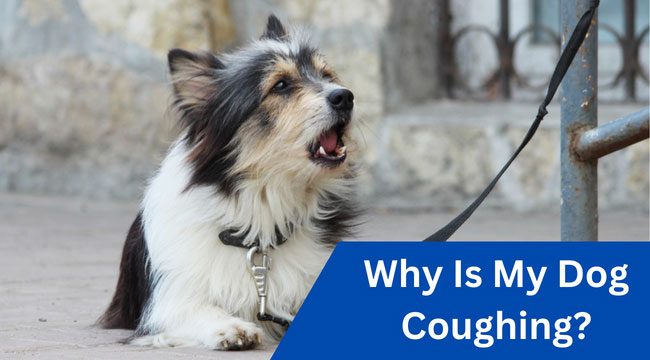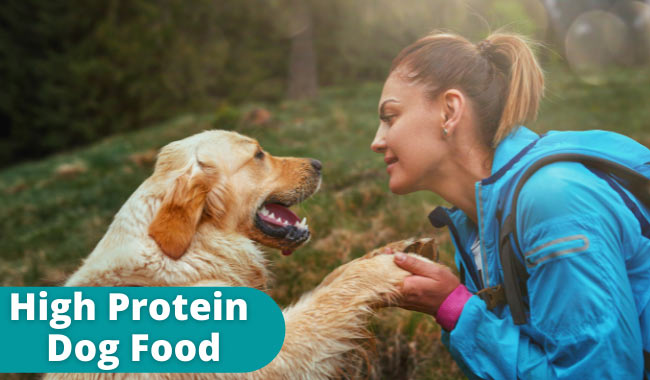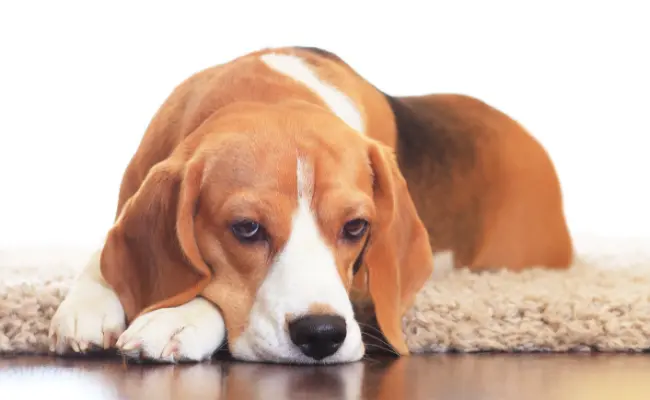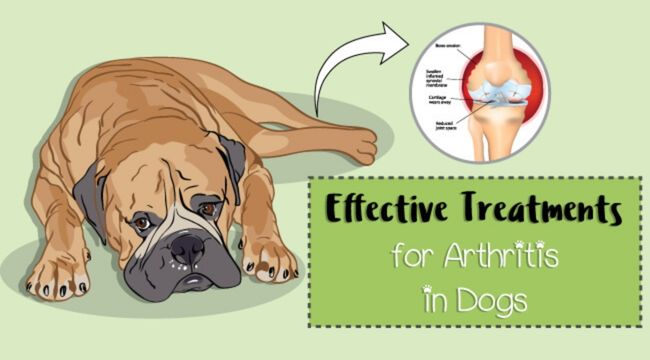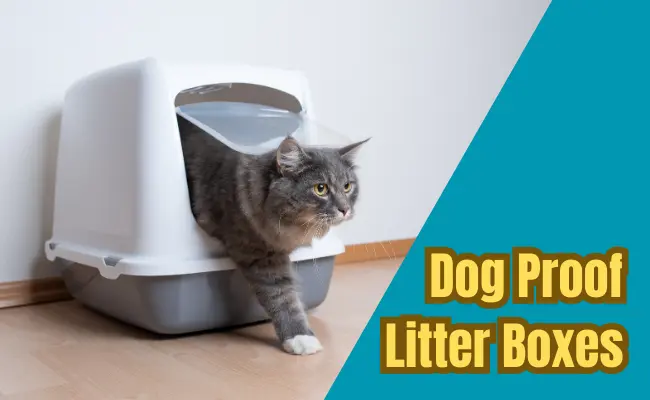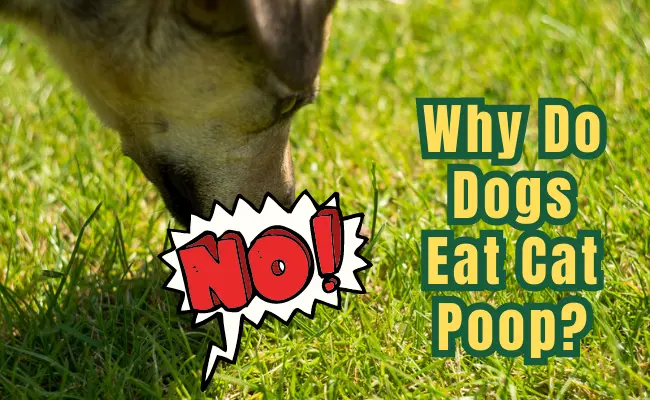
Waghound.com is an Amazon Associate, and we earn from qualifying purchases.
You catch your dog red-handed one day. It is hunched over the kitty litter with feces coating its mouth. Your reaction is something like: Yikes! That’s disgusting! While this repulsive behavior sure is puzzling, you can rest assured that you’re not alone in this – it’s a common canine habit.
But what could be so good about munching the nasty excrements of another creature? Not to mention that it could be infested with germs, bacteria and god knows what else.
Does your dog’s continuous bad behavior have you at the end of your tether? Not to worry. Luckily for you, we’ve put together this comprehensive guide that will help to explain this behavior and suggest ways you can put a stop to it.
Why do Dogs Eat Cat Poop?
The scientific term for consuming feces is called “coprophagia”. Surprisingly, about 24% of dogs have engaged in this behavior at least once, according to research. The tendency to do this may arise from numerous psychological and environmental reasons. These include:
#1. Lack of Food
Dogs are primarily scavengers which means they will eat just about anything to survive. Be it rocks, garbage or even feces. During times of extreme hunger and starvation, consuming feces may be the only option.
#2. Fondness for Cat Food
Cat food is a delicacy amongst dogs. Cat poop is basically the undigested remains of cat food. Dogs can smell traces of cat food in their feces and are attracted to it. It’s believed they may even enjoy the taste as they keep coming back for more.
#3. A Desire to Explore
Dogs possess a great enthusiasm for the unknown. In the spirit of adventure, they begin to explore. Exploration leads to discovery and discovery may lead to a reward. If the discovery leads to a worthwhile reward, the dog may become addicted to the dopamine release on attaining the reward. This gives rise to bad habits, such as eating cat poop.
#4. Alienation
According to research, lonely dogs are much more likely to feast on the fecal matter than dogs that receive more attention.
#5. Too Much Time in Enclosed or Crowded Spaces
Coprophagia is prevalent in shelter dogs who are often rescued from small, overcrowded spaces. This can also apply to multiple dogs that share a house. The greater the number of dogs sharing a living space, the greater the risk of this behavior.
According to statistics, 20% of dogs in single dog households have the condition. This rises to 33% in dogs who live in households with three dogs or more.
#6. Anxiety
It can get frustrating for owners to deal with excrement in the house, especially during the initial phases of housetraining. However, yelling at your dog to stop the behavior will only cause anxiety. Whenever your dog poops inside the house, it may then try to eat the droppings to hide its tracks.
No matter how difficult things get, it is never acceptable to mistreat your dog. Abuse is never the solution!
#7. To Shock Owners
Some dogs possess this peculiar habit of deriving pleasure from shocking owners by eating their excrements. If this is the case, try to remain calm while you handle the situation. Do not provide them with a reaction.
#8. Improper Correlation with Real Food
Feeding dogs in a space that’s close to where they defecate may cause them to develop an association between the smell of food and the smell of feces. They will be unable to distinguish the two and start consuming feces as a result.
#9. Learned Behavior
Puppies might get confused when they catch a whiff of feces in their mother’s breath after she has groomed them. Mothers may also vomit food containing fecal matter to induce appetite. Puppies who catch their mother’s behavior can develop this habit.
#10. Close Quarters with Elderly or Sick Dogs
This may be due to instinct. Feces left lying in the den could be found by predators on the hunt or eventually become infested with parasites. For this reason, early canine ancestors would protect frail pack members by consuming their feces.
Is Cat Poop Harmful to your Dog?
Animal stools are filled with millions of microorganisms, some of which can pose a threat to your dog’s intestines. If salmonella is present in the stool, it can even be transmitted to humans. If your dog has eaten cat poop before, get it diagnosed for intestinal parasites even if it isn’t showing any signs. Rather be safe than sorry!
Furthermore, eating cat litter in very large amounts can cause intestinal blockages, although your dog would have to eat a lot of it to get to that point.
However, if your dog experiences difficulties when passing stool, get it checked by a veterinarian immediately!
What to do if you Catch your Dog Consuming Faeces?
Some owners become so repulsed when they see their dog eating cat poop that they have even abandoned them or given them up for adoption. Although this habit is disgusting, it is important to understand that, for dogs, this is not abnormal.
If you catch your dog in the act, do not despair. With the right training, you can teach your dog to stop.
However, you should first get your dog checked for the following conditions by the vet:
- Parasites
- Dietary deficiencies
- Malabsorption syndrome
- Illnesses which cause a spike in appetite such as diabetes, Cushing’s syndrome, and thyroid disease
- Drugs such as steroids etc
One of these illnesses could be the reason behind coprophagia in dogs.
How to Stop Dog from Eating Cat Poop
It can be difficult to rid your dog of this revolting habit. However, don’t give up! Consistency is key. Be relentless in your efforts and the results will follow. The following measures will help:
1. Swap the Litter Box for a Dog-Proof Alternative
Open cat litter boxes are easier for dogs to get to. In order to discourage your dog from eating from the litter box, try the following alternatives:
- Hooded Cat Litter Box
You could replace an open cat litter box with a hooded version. The gate could be placed on the roof of the box for young and fit cats; this way dogs can’t get into them. However, if your cat is old and suffers from arthritis, this is not a very good idea. You can also buy litter boxes with gates that are too small for a dog to fit their head through.
For some cats, hooded litter boxes feel like a prison and they may refuse to use them.
- Booby Trapped Litter Box
Alternatively, try booby trapping the litter box. You could place a canister containing compressed air with motion sensors or traps that snap shut. Every time your dog approaches the litter, he will then be attacked by a gush of loud air or get his paw stuck in the snap trap.
Keep in mind that you cannot have these traps near the litter box permanently or you risk giving your cat a nasty shock. This may actually discourage your cat from using the litter box too.
- Electric Cat Litter Box
You can even use an electric cat box that sweeps away cat waste into a bin after excretion. Your cat must be trained to adjust to the box.
2. Include a Gate to Prevent your Dog Getting to the Litter Box
To eliminate temptation, it would be best to place the litter box out of sight. You should frequently clean the litter box since the stronger the odors of cat waste, the greater the temptation for your dog. However, there is no putting off a determined canine. You can prevent access by adding gates to the entrance of the litter box.
- Baby Gates
If you own a big dog, consider buying baby gates. Cats can jump over or slink through the spaces between the bars in the gate, whereas dogs will not be able to.
- Cat Flaps or Microchip Controlled Gates
If you own a tiny dog, cat flaps or microchip-controlled doors are better options. The sensor in microchip doors can identify the code on the cat’s collar to provide it entrance. This prevents dogs from getting in.
3. Relocate the Litter Box to Higher Ground
Another possible solution is to place the litter box high up on a shelf or table. Most dogs don’t climb and subsequently can’t reach great heights.
4. Train the Dog
Fortunately, you can also train your dog out of this habit. Remember to stay patient and never mistreat your dog. Abuse will scare your dog into carrying out its tendencies in secret. Instead, stick to the following recommendations:
- Don’t Compete with your Dog
Trying to beat your dog to the cat poop and swiftly scooping it away may backfire. Your dog will likely see you as competition and think it’s a game. Doing this does not discourage them.
- Supervise Bathroom Breaks
Keep an eye on your dog during bathroom breaks. If your dog shows signs of inching towards the waste, command your dog to stop. Put some treats in your fist and let your dog sniff it. Direct it away from the feces and feed it some treats (not the ones in your fist). This teaches your dog that no matter how tempting the poop looks, there is an even better reward if they don’t eat it.
Make sure to give loud, verbal commands to drill the idea into your dog’s mind that eating poop is not okay.
5. Add Supplements to your Dog’s Diet
Some dogs suffer from dietary or enzyme deficiencies. For instance, studies show that dogs lacking in Vitamin B were more likely to be poop eaters. Microbial action on poop produces this vitamin as a metabolite. These dogs may suffer from deficiencies as a result of bacterial overgrowth in their stomach lining or a parasite infestation that reduces their ability to absorb nutrients.
In other cases, dogs may lack an enzyme to break down protein. They may resort to eating poop to obtain these essential proteins. Owners can do the following to prevent and treat deficiency diseases:
- Change your Dog’s Diet
Provide a high-quality diet for your dog that’s rich in meat. Make sure that the dog food you are buying has meat such as beef, chicken, or turkey written first on the ingredient list.
- Feed your Dog Meat with Tenderiser Powder
Papain is a popular ingredient in meat tenderizers that can be given to your dog to treat a protein deficiency. This enzyme helps to break down amino acids.
6. Make Cat Poop Unattractive to your Dog
Certain ingredients are as revolting to dogs as feces are to humans. Some of these are monosodium glutamate, chamomile, pepper-plant derivatives, yucca, garlic, and parsley. You can deter your dog from consuming cat poop by spraying these substances on the poop.
Dogs have a bizarre preference for fresh, hard stools. In fact, the harder it is the better. They tend to avoid soft stools or diarrhea. You can use this to your advantage and change the consistency of cat feces by feeding pumpkin to your cat or adding vegetable oil to the stool.
You have to keep doing this to cat poop several times before your dog finally decides that scavenging poop isn’t worth it.
7. Keep your Dog Distracted
A bored dog is much more likely to engage in poop eating than an occupied dog. Keep your dog engaged in fun activities to steer it away from this behavior. Give your dog new toys to play with. Chew toys or tasty treats keep their mouth occupied. You can even bring over playmates.
Make sure you spend plenty of time with your dog to reinforce positive behavior through supervision and example.
Some Things to Keep in Mind
Unfortunately, the solutions mentioned above aren’t cure-alls. You can’t stop your dog’s instincts but you can try to reduce the expression of these instincts. Even if you temptation-proof your home, your dog may switch to snacking on the neighborhood or stray cat poop.
Either way, get your dog checked regularly by the vet. If the habit persists, put a muzzle on your dog whenever they go outside.
Related Read: Best Dog Training Collar Reviews- Safe Choices For Your Dog
Conclusion
Consuming nasty, germ-ridden feces is a habit that can spread diseases from dogs to humans. It is essential that you make your dog kick this habit. Most trained dogs will respond to commands and leave the cat poop alone. By consistently using the above tactics, you can discourage your dog from repeating this behavior less and less until they completely abandon it.
Lastly, Coprophagia is a disgusting habit but no matter how angry you get, never abuse your dog!
